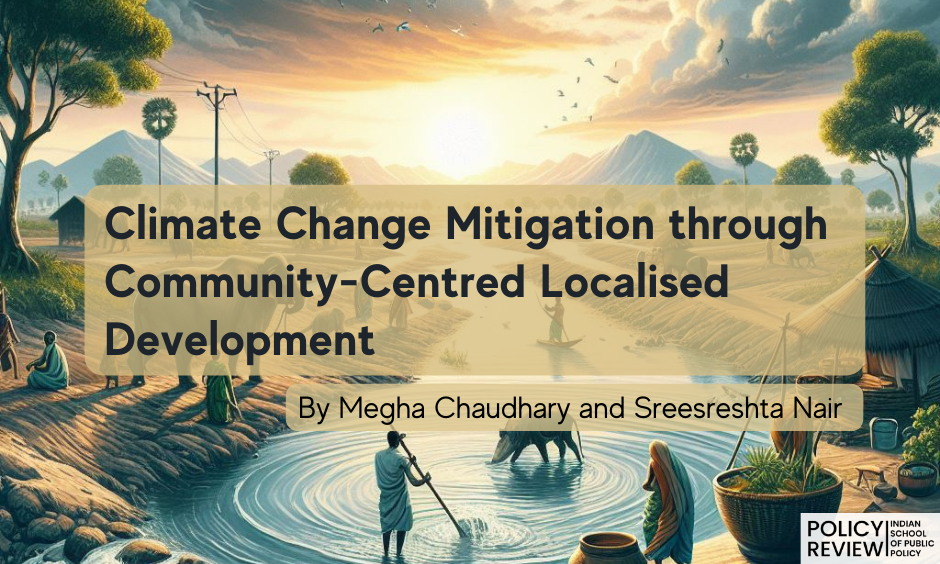
Climate Change Mitigation through Community-Centred Localised Development

A strong and vibrant community’s role remains central in building resilience and adapting to a changing climate. Around the world, there is a growing consensus on the critical role of community-level initiatives and traditional indigenous knowledge regarding climate change (Shen, 2021). Rather than considering the community as a mere mechanism to implement a centralised idea of adaptation and resilience, it is crucial to locally empower them and use localised wisdom and initiatives for building sustainable and regenerative development models. But in the current scenario, the producers and consumers have become distant entities. The choices have not necessarily remained ethical, and the diverse cultures have been homogenised as the unique individuals are transformed into mass consumers (Hodge, 2016).
In searching for ways of community empowerment, India has rich sources in terms of theory and practice. Mahatma Gandhi was way ahead of his time with his critique of the modern development model for its lack of sustainability and vices of overconsumption. In many ways, Gandhi was an ideologue for the green movement ahead of its time (Guha, 2023; Gandhi, 1909). With that said Gandhi’s entire model of self-reliant village republics shall be both non-viable and non-desirable in today’s context. However, a reimagined conceptualisation of localised development with decentralisation of power and community at the centre of development planning is as essential as ever. Gandhi’s ideas also became relevant in mass-scale migration from Indian villages towards cities (Economic Times, 2023). A 21st-century conceptualisation of Gram Swaraj based on rural-urban interdependence is an idea whose time has indeed arrived.
The community-based decentralised model of natural resources management, as successfully developed by Tarun Bharat Sangh in Rajasthan, can certainly be a blueprint and successful example among many others for similar initiatives across the country. In the case of Tarun Bharat Sangh, one can also realise how decentralised management of water resources cannot be seen in isolation, for it also paved the way for the betterment of other development indicators, including women’s participation, women empowerment, financial inclusion, better livelihoods, etc. (Down To Earth, 1999; KUMAR, n.d.). Similarly, in Germany, projects that involved community planning and management of renewable energy projects, such as wind farms, have been successfully implemented. Citizen involvement was vital to these successful ventures, leading to greater acceptance of renewable energy projects. According to a recent paper published by Nature Scientific Report, 22,830 European projects that are guided by the community are currently underway (Schwanitz et al., 2023; Beer, 2023). However, this is not to suggest that community initiatives can replace state-led action but rather to argue for policies that will incentivise further localised action and use the existing community initiatives.
Another theoretical argument for the localised developmental model comes from the author of ‘Small is Beautiful,’ EF Schumacher, who himself was inspired by Gandhi, developed the whole idea of Buddhist economics as a challenge to the dominant narrative, serving as a guide in the quest for development within ecological limits (Schumacher, 1989). Schumacher’s insights into place-based economies become highly significant in the context of climate change. Promoting cooperative banking in local contexts is relevant to the discussion above, for it can serve as essential financiers for local renewable energy projects. It can be argued that Gandhi and Schumacher’s ideas are idealistic in practical applicability. These ideas may well provide starting points for conceptualising development while maintaining the environmental targets and ensuring the population’s greater sense of well-being.
A locally community-empowered pathway towards climate adaptation is also relevant to ensure the use of the wisdom of indigenous communities that have lived close to nature for centuries (UNFCCC, 2022). The local communities carry immense knowledge regarding local conditions, and therefore, they should be involved in the planning process to adapt climate policies for the specificities of the locality. Going beyond merely community-led initiatives, decentralisation of political power becomes central to ensuring proper people’s participation in development and climate policy matters. While the 73rd and 74th Amendments on paper call for greater decentralisation, it remains unfulfilled in several states. The successful disaster relief efforts in Kerala during the floods of 2018 and later in combatting the pandemic have been attributed to the capacity at local governance levels by several scholars (Babu et al., 2021).
In terms of broad policy recommendations, it is proposed to promote community involvement in the planning, implementation, and operation of renewable energy projects/policies, promotion of local co-operative institutions for climate adaptation projects, along with a greater focus on political decentralisation with the empowerment of the Gram-Sabhas. Even from a global viewpoint, if climate policies must receive large-scale public acceptance, they must adopt a bottom-up approach involving communities and the public instead of a one-size-fits-all, top-down paradigm.
Climate change has been rightly referred to by many as the most significant challenge ever confronted by humanity. It becomes more complicated due to the difficulty in realising how the chain reaction from climate change will influence human life as we know it. In parallel, the geological era termed by scholars as the Anthropocene is causing serious self-reflection within all fields of study regarding the conceptualisation of the human-nature relationship, including the agency of non-human elements and the divide between nature and culture (Latour, 2017). In this larger context, a developing country such as India has to plan its policy in dealing with a changing climate. In a complex issue such as climate change, there is no quick-fix solution; instead, it will be a concentrated effort that will have to bring together individuals, communities, nation-states, and markets for humanity to thrive in an ecologically balanced planet.
References:
- Babu, S., Ghosh, D., Gupte, J., Raza, A., Kasper, E., & Mehra, P. (2021, June). Kerala’s Grass-roots-led Pandemic Response: Deciphering the Strength of Decentralisation. IDS Working Paper, 2021(552). https://niua.in/intranet/sites/default/files/IDS_Working_Paper_552.pdf
- Beer, M. (2023, May 29). Community Wind Farm Earns Support, Generates Income in German Village. The Energy Mix. Retrieved December 13, 2023, from https://www.theenergymix.com/community-wind-farm-earns-support-generates-income-in-german-village/
- Down To Earth. (1999, 3 15). Waters of life. Down To Earth. Retrieved September 12, 2023, from https://www.downtoearth.org.in/coverage/waters-of-life-19486
- Economic Times. (2023, April 18). India’s migrant millions: Caught between jobless villages and city hazards. The Economic Times. https://economictimes.indiatimes.com/news/india/indias-migrant-millions-caught-between-jobless-villages-and-city-hazards/articleshow/99580893.cms?from=mdr
- Gandhi, M. K. (1909). Hind Swaraj, Or, Indian Home Rule. Navajivan Publishing House.
- Guha, R. (2023, June 3). op-ed | The green Gandhi: An ancestor of the environmental movement. Telegraph India. https://www.telegraphindia.com/opinion/the-green-gandhi-an-ancestor-of-the-environmental-movement/cid/1941808
- Hodge, H. N. (2016). LOCALIZATION: essential steps to an economics of HAPPINESS. Local Futures. Retrieved September 13, 2023, from https://www.localfutures.org/wp-content/uploads/Localization-Booklet-download.pdf
- KUMAR, R. (n.d.). Community Based Natural Resources Management in Villages of Alwar District of Rajasthan. UNDP. Retrieved September 12, 2023, from https://www.undp.org/sites/g/files/zskgke326/files/migration/in/community-based-natural-resource-management-in-the-villages-of-a.pdf
- Latour, B. (2017). Facing Gaia: Eight Lectures on the New Climatic Regime (C. Porter, Trans.). Wiley.
- Schumacher, E. F. (1989). Small is beautiful. HarperCollins.
- Schwanitz, V., Wierling, A., Paudler, H., Beck, C., Dufner, S., Knutsdotter Koren, I., Kraudzun, T., Marcroft, T., Mueller, L., & Zeiss, J. P. (2023, March 2). Statistical evidence for the contribution of citizen-led initiatives and projects to the energy transition in Europe. Nature. https://www.nature.com/articles/s41598-023-28504-4
- Shen, S. (2021, November 5). Biodiversity and climate crisis—the pivotal role of local communities and Indigenous Peoples. World Bank Blogs. Retrieved September 12, 2023, from https://blogs.worldbank.org/climatechange/biodiversity-and-climate-crisis-pivotal-role-local-communities-and-indigenous-peoples
- UNFCCC. (2021, February 26). The Explainer: The Paris Agreement. UNFCCC. Retrieved September 13, 2023, from https://unfccc.int/blog/the-explainer-the-paris-agreement
- UNFCCC. (2022, August 9). How Indigenous Peoples Enrich Climate Action. UNFCCC. https://unfccc.int/news/how-indigenous-peoples-enrich-climate-action

Sreesreshta Nair
Sreesreshta Nair is a final year student of Masters in Development Studies at Tata Institute of Social Sciences (TISS), Mumbai. He is a graduate in Management Studies (BMS) from Narsee Monjee College of Commerce and Economics, Mumbai. Sreesreshta’s area of interests include Decentralization, Public Policy, Behavioral Economics, Indian politics, and Non-Dual Philosophy.
Sreesreshta Nair on social media:
Linkedin: https://www.linkedin.com/in/sreesreshta/
Instagram: https://www.instagram.com/sreesreshta_nair/

Megha Chaudhary
Megha is a final year student at Tata Institute of Social Sciences, pursuing Masters in Development Studies. She has been actively engaged in research through her dissertation on Disappearing traditional knowledge and its policy analysis. She developed an interest in the Climate change debate in the course of reading multiple perspectives and proposed solutions on it by a diverse set of authors.
Megha Chaudhary on social media:
Linkedin: https://www.linkedin.com/in/meghachaudhary23/
Instagram: https://www.instagram.com/meghachaudharyy/

